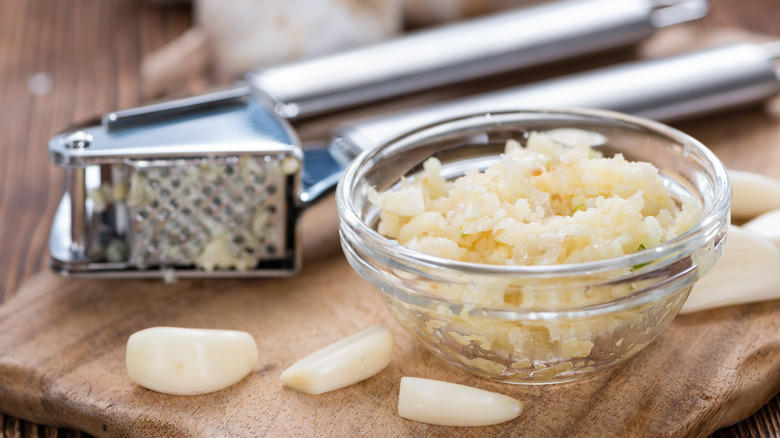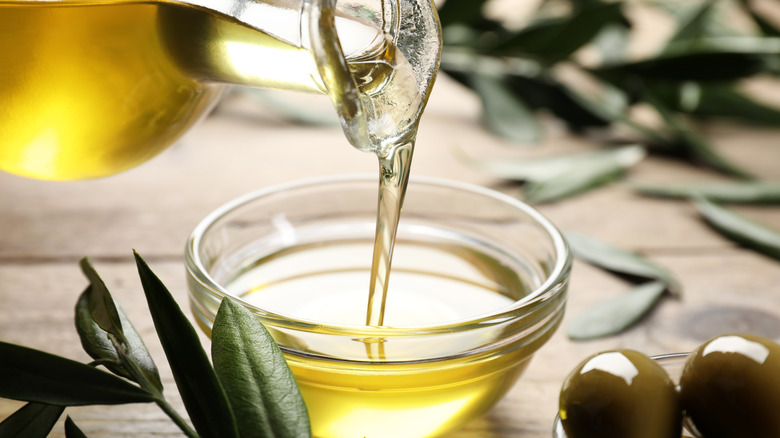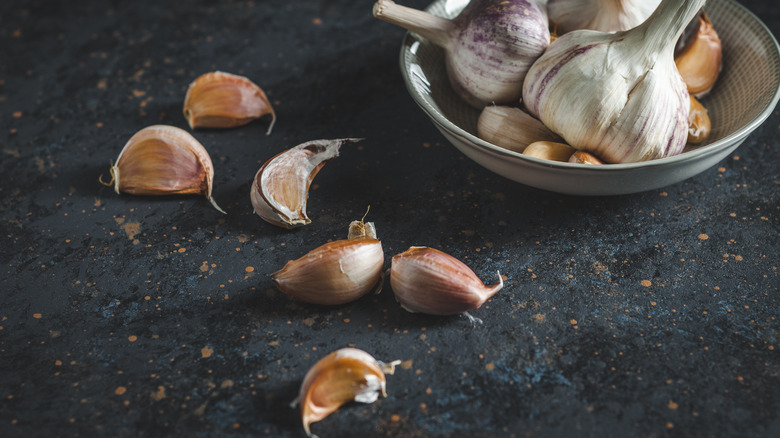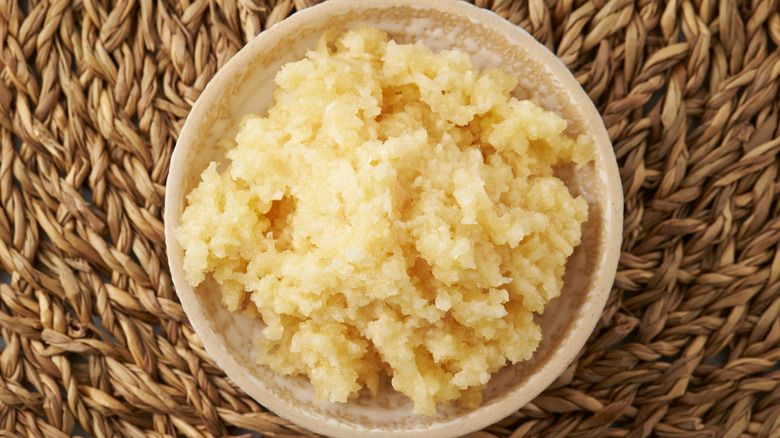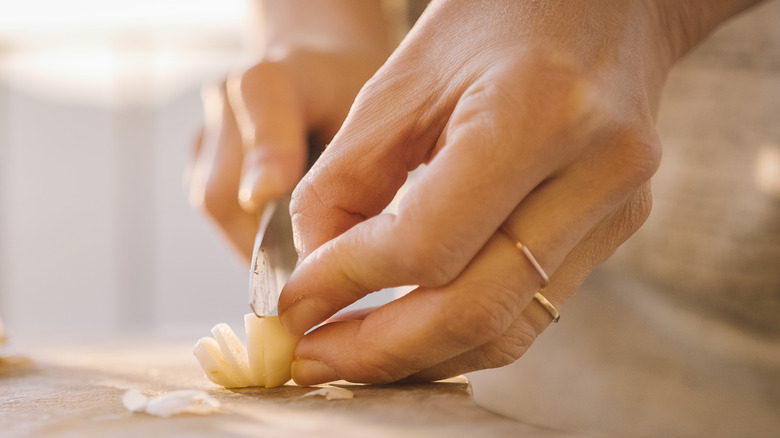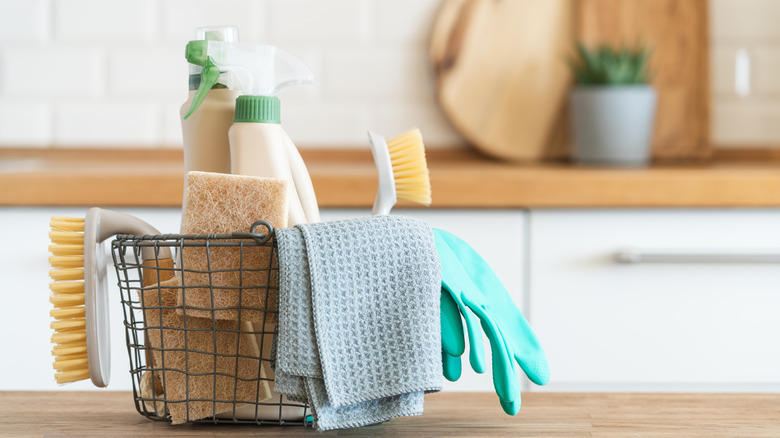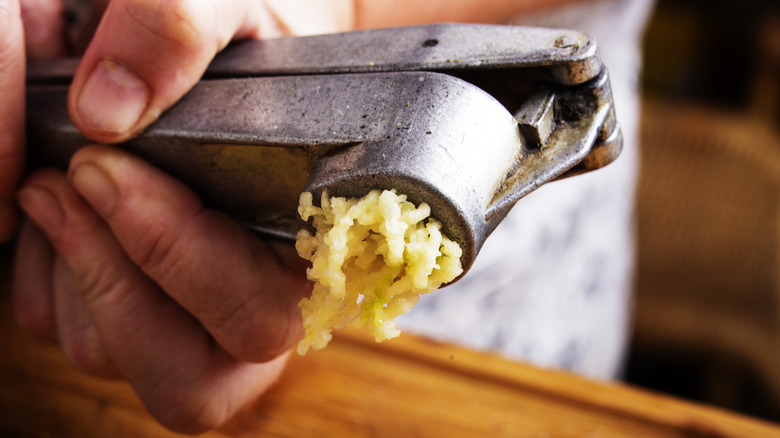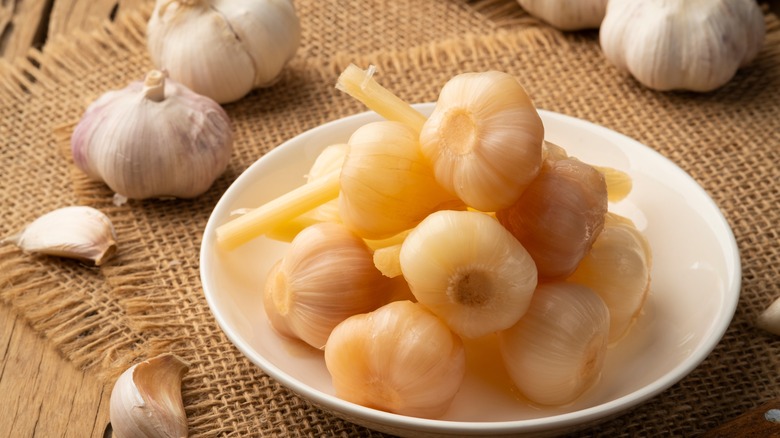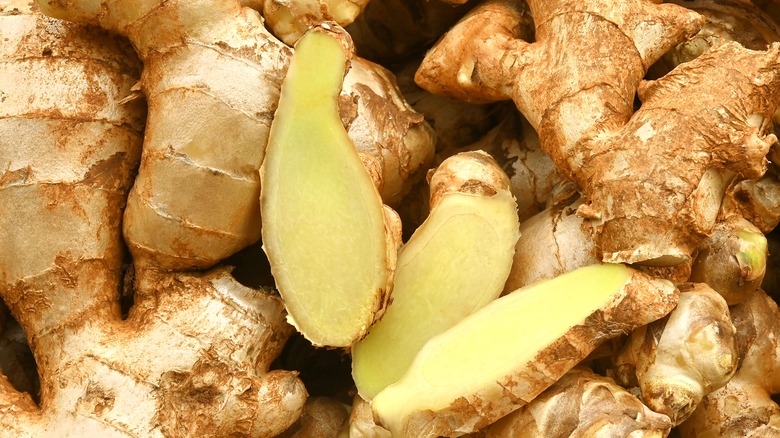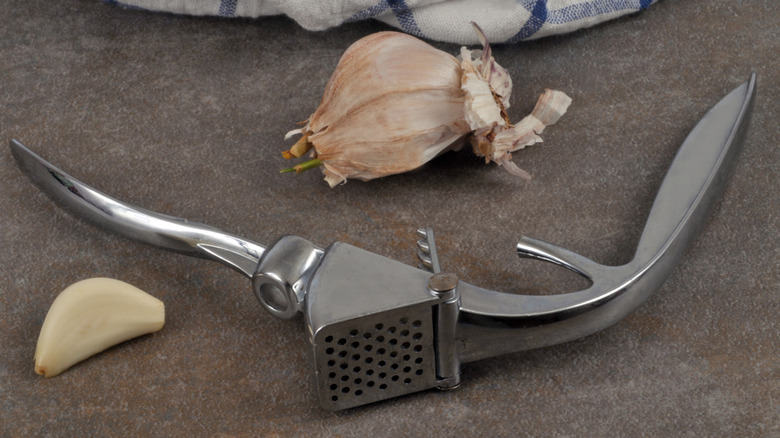10 Mistakes You're Making When Using A Garlic Press
Stop the garlic presses! You may be doing it wrong. If you like garlic — no, if you "clove" it — then you need to be sure you're getting the most out of each and every piece. First things first: Why press garlic? To get the most impactful and pungent flavor, breaking up the cells in a clove of garlic (also known in Latin as Allium sativum) releases the chemical allicin, which gives garlic its distinctive smell and provides a variety of cardiovascular health benefits. Additionally, garlic tastes great as a Cheesy Roasted Garlic Soup, a Sticky Garlic Cauliflower Wings side dish, a Savory Garlic Cream Cheese spread, and so much more! The garlic press is a super useful kitchen gadget that can be both a time-saver and a flavor enhancer. It might seem intimidating at first crush, but once you start, it'll be tough to put down. These tips will help make the process of pulverizing garlic even more efficient, yielding impressive and delicious results.
Doing it dry
It may seem tempting to just press away without a care, but proper preparation of your kitchen tool is what will help it — and your cooking — go the distance in the kitchen. Adding a tiny amount of cooking oil (olive oil is recommended) to the cup or well of your press prior to loading the garlic in is a great way to lubricate the press, making the action smoother, thus mitigating the potential for hand fatigue when it comes to the admittedly repetitive albeit definitely fulfilling task of pressing garlic. Think of it along the lines of seasoning a wok, wherein the oil creates a protective and nonstick coating against the metal. If you cook with a lot of garlic and are planning on frequent use out of your garlic press, then it's paramount to keep the press in tip-top shape for squashing garlic clove after garlic clove. Your hands will certainly thank you too.
Peeling the garlic cloves
There are many ways to peel a garlic clove, but even less reason to do so when you are using a garlic press. As long as you separate the clove from the bulb, go ahead and keep its little "jacket" on, load the whole clove into your press, and let 'er rip. This will effectively peel the garlic for you, allowing the garlicky goodness to spew forth, and leaving the papery skin behind. As mentioned above, oiling the well of your garlic press prior to use will make this whole process even more simple and effective. Although it might seem easier to peel and press, considering just how sticky garlic gets when it's crushed and the allicin is released, keeping the skin on will also help with the cleanliness and non-stick aspect of using a press. Just make sure to carefully clean out the chamber in between uses and toss out the left-behind peel.
Not pre-mincing for later
Did you know that you can store your own minced garlic for up to a year in the freezer or about a week in the fridge? If you have the time and space, this is a great way to save garlic for future use without sacrificing too much of the flavor and texture. Use an airtight jar or even an ice cube tray, and make sure to add a sufficient amount of oil to the garlic before freezing. This will keep the garlic on hand and ready to pop out and thaw just the right amount whenever you need it. Remember: An airtight container is imperative so that the rest of your freezer doesn't end up smelling like garlic (unless, of course, you're into that). If you own a vacuum sealer, this is also another smell-proofing option. Setting aside time in the kitchen for a little press-and-prep will end up saving you lots of time in the future.
Chopping the pieces first
There's no need for this extra step, especially if you're planning to leave the peel on your garlic. Get the most out of every last bit by popping garlic cloves into your press whole and ensuring that you don't waste a drop of garlic oil or allicin. That said, do make sure to chop off the stems of the cloves for a smoother effect in terms of separating the skin from the clove. Keeping the already mentioned tips in mind, skipping both peeling and chopping will make quick work of your garlic press with much easier cleanup and neater results. Additionally, it's prudent to make sure that the garlic press you choose has a large enough well to comfortably fit a good sized clove of garlic before it gets smushed into pungent perfection. Again, it's all about saving your hands from fatigue and making your time in the kitchen even more efficient and effective.
Being lax with cleanup
As simple as a garlic press makes prep work, there is still a mess to be made. As with any other kitchen tool, it's imperative to keep your garlic press clean and functional. You don't want dried up petrified garlic infesting every crevice and making the tool more difficult to use in the future, and you especially don't want to run the risk of some gnarly dried out piece of garlic accidentally getting mixed into the dish you've been painstakingly preparing. Take culinary caution and definitely don't skip the cleanup or postpone it for later. Make your garlic press the first item you clean, and be sure to do a thorough job. The best way to clean a garlic press is with a dedicated toothbrush that you have decommissioned and set aside just for cleaning and a toothpick to dislodge any extra tiny pieces. Hand wash with warm water and skip the dishwasher on this one. Think of your garlic press as a specialty item that requires and deserves this extra care and attention.
Not wearing gloves
Albeit delicious, the lingering smell of garlic on your hands might just distract you from enjoying your carefully crafted dish, even more so if you've planned a dinner date that gets disrupted by an unwelcome odor. The last thing you want after spending all that time in the kitchen is to be followed by a garlic ghost that won't disappear. Disposable nitrile gloves are an excellent way to preserve your hands from getting all sticky from the garlic oil and smelly from the allicin released. Further, wearing a pair of disposable gloves in the kitchen is also a great way to prevent food slippage when you're handing other sharp implements in the kitchen. Just be sure to swap out for a fresh pair as needed and be mindful of cross-contamination.
Crushing without a destination
The best thing about using a garlic press is the ability to make use of every little part of the garlic. Between the actual mincings and the garlic oils produced by the act of crushing, it's prudent to preserve your work. If you're crushing atop a cutting board, you're essentially wasting a lot of the valuable and tasty liquid and possibly even some of the smaller minced pieces. Whereas a flat surface will let the liquid from your pressed garlic spread all over the place and get lost, a container that will hold these fresh pressings is your best bet. By either using a bowl first or simply and carefully pressing the garlic directly into your dish or pan, it will ensure that all the oils and goodness don't get lost on a countertop or absorb into a cutting board. With garlic, potency is key, and keeping all elements of the crushed cloves — save for the skins, of course — preserves this potency and enriches your cooking to maximize the flavor.
Measuring improperly
Is there such a thing as "too much" garlic? Though such a concept may be difficult to fathom when speaking of potency, because of the high concentration of allicin produced by freshly pressed garlic, it is especially pungent and flavorful in its raw, crushed state. As such, proper measuring ensures you don't overpower your dish with a punch of garlic instead of a pinch. Going slowly and carefully when adding freshly pressed garlic to a dish and tasting along the way is an excellent method to ensure all the flavors of your cooking blend well together and you haven't just garlicked a dish beyond recognition. A couple of cloves to start with is a good baseline to which you can always add more as needed. It's important to note, however, that while adding more pressed garlic to a dish is easy, removing it from your cooking is almost, if not entirely, impossible.
Only pressing garlic
Beyond its obvious use as a time-saving tool in the kitchen when preparing garlic for cooking, a garlic press can be used for so much more than just garlic. In fact, the possibilities extend far beyond garlic from savory, sweet, and even craft-related options. For example, utilizing your press on herbs and toasted whole spices helps to preserve the aromatic intensity and add a new layer of complexity to your dish while saving time and effort in the kitchen. Much like with garlic, pressing into a bowl or directly into your dish keeps all of the flavor of your herbs and spices concentrated exactly where you want it to go without sacrificing it to a countertop or cutting board. Depending on your style of garlic press and individual hand strength, a freshly peeled hunk of ginger root can also be quickly minced in a garlic press either by itself or alongside a clove of garlic to make a paste. On the sweeter side, using your press to crush up candy or baking chips as a garnish for desserts is an excellent alternative use as well.
Getting the wrong press
Knowing what your needs are when it comes to kitchen gadgets as well as the variety of alternative uses a garlic press has the potential for allows you can make the right decision when it comes to getting a garlic press. Research is important to find the most dependable press for your kitchen rather than simply picking up the first one you see at the store, which may or may not do the job as well as it could or should. Focusing on high-quality materials for regular use is key. Further, consider the uniformity of the bladed holes of the tool, as you will want a press that ensures consistent mincing of each piece for more thorough and even cooking. Also, be sure that the "foot" part, which will be doing the actual pressing, has a sizeable surface area and some heftiness to it to make the act of pressing easier on you and harder on your garlic.
